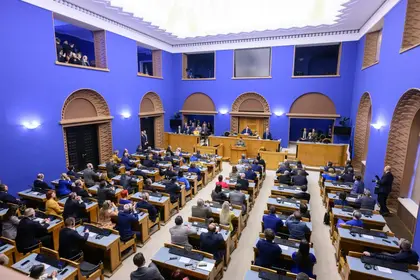Estonia’s Ministry of Foreign Affairs declared a Russian diplomat persona non grata over what it called “interference by Russia in Estonia’s internal matters” and “anti-security hybrid operations.”
The Estonian ministry reportedly summoned the Russian Embassy’s charge d’affaires on Tuesday, March 19, and handed over a diplomatic note to formally inform the diplomat of Tallinn’s decision, according to the Estonian news outlet ERR. The ministry’s social media channel also confirmed the incident.
JOIN US ON TELEGRAM
Follow our coverage of the war on the @Kyivpost_official.
Margus Tsahkna, Estonia’s foreign minister, said the incident involved a case in which the Russian diplomat was involved in the illegal distribution of judicial material on Russian social media.
“With its activities, the Russian Embassy has illegally interfered in Estonia's internal affairs, more specifically in the judicial process, when it acquired the documents of a criminal case and contributed to their publication on Russian social media,” Tsahkna said.
The details surrounding the criminal case cited by Tsahkna were not immediately clear at the time of publication.
Tsahkna also voiced Tallinn’s protest against what it called “anti-security hybrid operations” by Moscow’s representatives.
“The coordinated actions of the Russian special services against the Republic of Estonia, including anti-security hybrid operations, are inadmissible and must stop. We do not tolerate or accept interference in Estonia's internal affairs and react to such a situation quickly and concretely.

Moldova Residents Caught in the Middle of Gas Fight
“By expelling the diplomat, we show that Estonia does not allow any activity organized by a foreign country on its territory,” he said.
Estonia’s Ministry of Foreign Affairs said it is discussing the issue with its partners and does not rule out “additional measures” to protect its national interests.
Estonia, a NATO member sharing a border with Russia, has been one of the most vocal supporters of Kyiv following Moscow’s full-scale invasion of Ukraine. In January, it announced plans to commit 0.25 percent of its gross domestic product (GDP) – close to $120 billion – over the next four years to provide Kyiv with military aid, calling for its Western allies to do the same.
In September, it prohibited all vehicles with Russian registration from entering the country.
The Baltic state is also the main backer of the Tallinn mechanism, a collective effort to bolster Ukraine’s cybersecurity capabilities.
You can also highlight the text and press Ctrl + Enter










